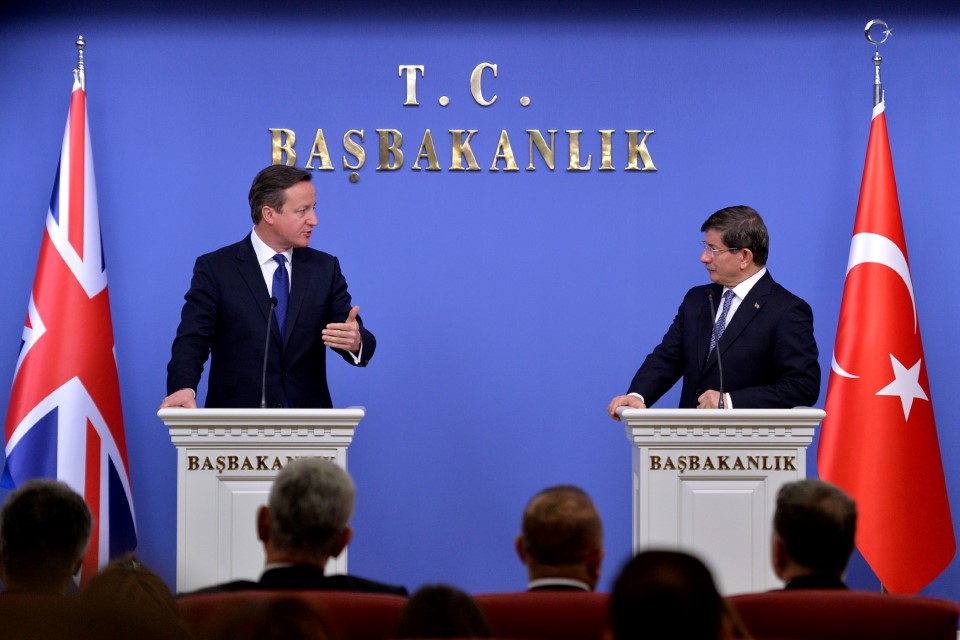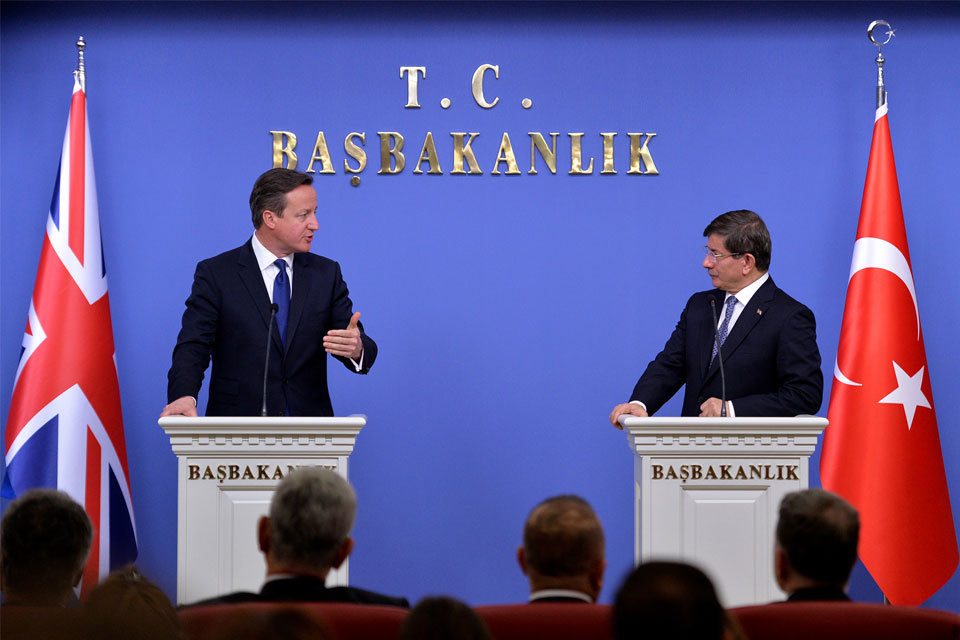David Cameron and Ahmet Davutoglu press conference in Turkey
The PM held a joint press conference with Ahmet Davutoglu where he spoke about economic and national security and the fight against ISIL.

Prime Minister
Thank you very much. Well, it’s great to be back in Turkey. This was one of the first countries I visited 4 and a half years ago, and I’m delighted to come back and have such good discussions today. Our bilateral relationship between Britain and Turkey is strong, and I believe that it can get even stronger in the years ahead.
I particularly wanted to come today because I think it is so clear for people in Britain that our economic security and our national security are very much tied up with having a good relationship with Turkey and all her people. When I came about 4 and a half years ago I said that this was exactly the sort of economy that I wanted Britain to have closer ties with, more trade with, more investment with, as part of delivering prosperity and jobs and growth back at home in the United Kingdom.

David Cameron and Ahmet Davutoglu press conference
Former Prime Minister, now President Erdogan, and I set a target of a 100% increase in our trade. We’ve done 60% so far. We believe we’re on track and on target for that level of increase, and the ambition is there and we’ll continue to work for it. And there’s good news today that the insurance market in Turkey is being further opened up in a way that is very good for British businesses and British firms, and I’d urge more British firms to come and see how they can invest and trade in Turkey.
But the issue of national security is as important as the issue of economic security. We are fighting a common enemy, a common enemy in extremist terrorism, and the Prime Minister and I have been discussing today how we’ll work as closely as we possibly can, whether it is about stopping people coming through Turkey to Syria or Iraq to fight for ISIL (Islamic State of Iraq and the Levant), whether it’s about making sure we deal with people when they return or whether it is the highest levels of intelligence cooperation that we can possibly achieve between our countries. This is all about making sure people are safer in Turkey and making sure people are safer back home in the United Kingdom. So I see this as absolutely vital work, and the partnership between Turkey and Britain, I believe, is strong already but should get stronger.
As you said, Prime Minister, we also discussed the long-term strategy we have to defeat ISIL and to restore stability to this part of the world. I think we share exactly the same perspective, which is that what we need in Iraq is what we need in Syria. We need to see governance that can represent all of their people, whether they are Sunni or Shia or Kurd, and we need to see in Syria a government that can represent all of the people, and we need to work towards that long-term objective.
We also discussed EU issues. We discussed Cyprus. We discussed the very great pressure your country has faced from refugees, and I’m proud of the fact that Britain is one of the largest donors in terms of helping refugees from Syria. And it’s important, particularly at this time of year with the weather turning so cold, that we make sure we look after those people and give them a good future.
Thank you very much for the welcome today, the good discussions. I think particularly when it comes to the long-term strategy of dealing with this extremist terror, of dealing with ISIL, we’ve made some good progress in understanding the very common position we have. Good governance is the – as the UN Secretary General put it, a missile can kill a terrorist, but it’s good governance that kills terrorism. And that’s at the heart of the shared view that we have today.
Question
[In Turkish, no translation available]
Prime Minister
First of all, let me take the question about the report issued today, and let’s be clear: torture is wrong. Torture is always wrong. Those of us who want to see a safer, more secure world, who want to see this extremism defeated, we won’t succeed if we lose our moral authority, if we lose the things that make our systems work and our countries successful. So we should be very clear about that.
Now, obviously after 9/11 there were things that happened that were wrong, and we should be clear about the fact that they were wrong. In Britain we have had the Gibson Inquiry, and that inquiry has now produced a series of questions that the Intelligence and Security Committee will look at. But I’m satisfied that our system is dealing with all of these issues, and I as Prime Minister have issued guidance to all of our agents and others working around the world about how they have to handle these issues in future.
So I’m confident this issue has been dealt with from the British perspective, and I think I can reassure the public about that. But overall, we should be clear: torture is wrong.
Ahmet Davutoglu
[In Turkish, no translation available]
Question
[In Turkish, no translation available]
Ahmet Davutoglu
[In Turkish, no translation available]
Question
If I may ask Prime Minister Cameron also a domestic question, and then to you, sir, after that. Prime Minister Cameron, is Turkey doing enough to keep Britain’s streets safe from ISIL? What else specifically do you think Britain can help them do to stop ISIL fighters crossing the border? And just 2 quick questions: 4 years ago you were here and you said you want to make the case for Turkey’s EU membership. Are you still making that case, given your drive to control migration? And just finally, you said in May of this year, that the Chilcot Inquiry would be published by the end of the year, by Christmas, because the public wants answers. When will it be published?
To the Turkish Prime Minister – on foreign fighters, are you happy that Britain will deny access back to Britain of foreign fighters who may be left languishing here, abandoned here, becoming your problem, not our problem?
Prime Minister
Okay, let me take your questions in reverse order. On the Chilcot Inquiry, nothing has changed in terms of my view, but I’m not in control of when this report is published. It’s an independent report. It’s very important in our system that these sorts of reports aren’t controlled and timed by the government. They’re controlled and timed by the independent inquiry board that has carried out that vital work, and when they publish is a matter for them.
In terms of Turkey’s membership of the EU, I very much support that. That’s a long-standing position of British foreign policy which I support, and we discussed that again in our talks today.
On the question of what more can Turkey and indeed Britain do to stop this scourge of foreign fighters and defeat this ideology of violence, I believe we are, all of us, taking the steps that we should. We’ve passed legislation through our parliament, we are taking away people’s passports, we’re confronting and prosecuting people who’ve travelled to Turkey. We are working as closely as we possibly can, and the Prime Minister and I have agreed that we should exchange even more information, we should cooperate more in terms of intelligence. We should work hand in glove, because the people who are travelling, whether from Britain or elsewhere, sometimes through Turkey, sometimes in other ways to Syria and Iraq, these are people that threaten us back at home. And so we should do everything that we can, and we’ve had very productive discussions today.